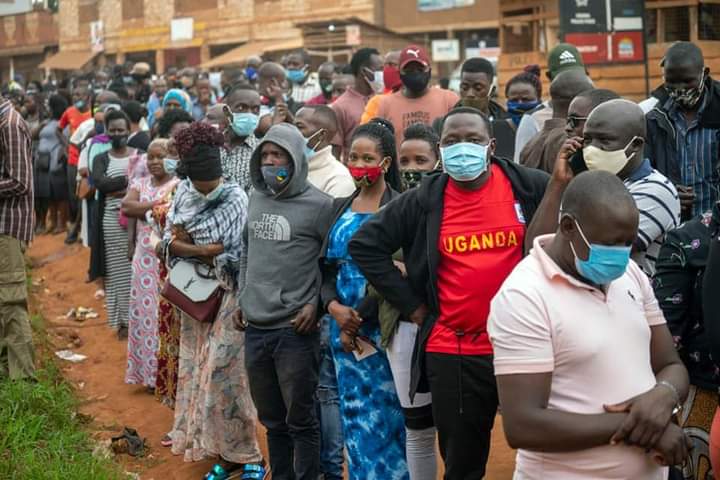By DAVID MAFIGIRI & MEGAN SCHMIDT-SANE /African Arguments/ – As COVID-19 spread rapidly across much of the world last year, Uganda managed to stay relatively unaffected. It has decades of experience in handling epidemics and its responsive National Task Force has long been a model for the rest of world. These helped keep cases low despite a wave around the end of 2020.
Since this May, however, the situation has changed. Three months after India experienced a huge surge, Uganda sadly followed suit. Cases skyrocketed like never before, with the country recording upwards of 1,700 new cases per day by mid-June. The country’s death toll from COVID-19 has almost tripled in this second wave. Nearly everyone seems to know someone who has caught the disease and horror stories of lost friends or relatives reach us every day. Hospitals are reportedly overwhelmed.
In response, Uganda has locked down again for and COVID-19 prevention measures are being applied with renewed vigour. But the country’s experience suggests that this is no longer enough with the much more infectious Delta variant becoming dominant. If countries like Uganda – and therefore the world – are to contain the pandemic, vaccine justice is urgently needed.
Uganda’s second wave
Uganda has a long history of successfully managing epidemics such as Ebola, Marburg virus, Rift Valley fever, and cholera. It has a sophisticated infrastructure and set of policies for doing so.
Its epidemic response is structured around the public health system and managed through a National Task Force (NTF), which has several sub-committees. In the event of any emergency, the Public Health Emergency Operations Centre is activated and the NTF plans, guides, and coordinates the response. The NTF structure is mirrored at the district and sub-county levels so guidance can be tailored and implemented locally. Since 2000, Uganda has also had an Integrated Disease Surveillance (IDSR) strategy, which has improved surveillance and links to other parts of the health system.
This preparedness meant that when the COVID-19 pandemic began, the government could quickly announce an array of measures such as lockdowns and awareness raising campaigns to curb its spread.
This worked well until the second wave hit this May. And as of 18 June 2021, Uganda has reimposed a total lockdown. For 42 days, schools and weekly markets are closed, inter-district travel is banned, and social gatherings and funeral services are suspended or reduced in size. To mitigate some of the devastating economic effects, the government is planning to send one-time cash transfers of 100,000 UGX ($30) to the most vulnerable, while the IMF has awarded the country $1 billion extended credit to help with the crisis.
In Kampala, people’s attitudes towards COVID-19 have shifted. While some previously thought the risk from COVID-19 was low, now many appreciate the gravity of the situation. Globally, there has been a crisis of public trust as many governments politicised the COVID-19 response and this exacerbated existing mistrust in public institutions. In Uganda, contested elections in January 2021 and stringent public health measures contributed to some citizens’ beliefs that the response was political. These beliefs are more complicated now that many more people now know someone who has been seriously ill or died. More people are wearing masks, communities are distributing posters on how to prevent the spread of COVID-19, and hand washing stations are re-appearing.
“A deliberate global architecture of unfairness”
These rapid measures have slowed down the spread, but they are not enough. The Delta variant, which is driving the current wave, is significantly more transmissible and potentially leads to more severe illness than other strains. As other countries have shown too, lockdown restrictions may help but they will not contain this variant, particularly within Uganda’s densely populated urban informal settlements.
It does not have to be enough. Several vaccines have been shown to be highly effective against the Delta variant, especially after two doses, and nearly 2 billion people in the world have now received at least one jab. A combination of immunisation and restrictions appears to be the one feasible way out of this crisis. Yet of 2 billion to been vaccinated, less than 1 million are in Uganda and just 36 million are in Africa.
While 67% of people in the UK and 55% of those in the US have received a vaccination, this falls to less than 2% for Uganda. This gross disparity poses the greatest threat to global health as we know it. It does not just mean that many more people will get ill and die in low and middle-income countries, but it significantly raises the likelihood that new COVID-19 variants – which could well be more resistant to vaccines – will emerge and spread.
This therefore is a clarion call to make COVID-19 vaccines available to the rest of the world. Vaccine inequity is the result of vaccine hoarding by wealthy nations or, as African Union Special Envoy Strive Masiyiwa recently put it, “a deliberate global architecture of unfairness”. What Uganda and the whole world needs is the immediate waiver of intellectual property rights and a global effort to produce COVID-19 vaccines at a more rapid rate.






